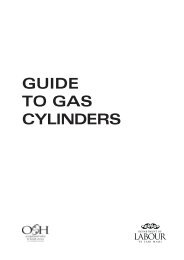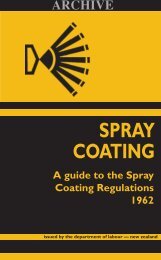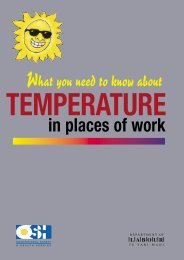Underground Petroleum Storage Tanks and Related Wastes - Code ...
Underground Petroleum Storage Tanks and Related Wastes - Code ...
Underground Petroleum Storage Tanks and Related Wastes - Code ...
You also want an ePaper? Increase the reach of your titles
YUMPU automatically turns print PDFs into web optimized ePapers that Google loves.
APPENDIX 6<br />
SAFE HANDLING OF PETROLEUM PRODUCTS<br />
General<br />
All petroleum products are hazardous. They can cause explosion or fire.<br />
Most petroleum products are toxic when not used with due care.<br />
Fire <strong>and</strong> Explosion<br />
All petroleum products must be treated as being potentially explosive even in<br />
small quantities.<br />
Petrol, aviation gasoline <strong>and</strong> most solvents evaporate readily, producing an explosive<br />
mixture with air. Kerosine, aviation turbine fuel <strong>and</strong> the less volatile solvents<br />
can also produce explosive vapours, particularly in poorly ventilated areas. All<br />
products can accumulate static electricity which may trigger an explosion —<br />
kerosine type products are particularly susceptible.<br />
Automotive diesel, fuel oils <strong>and</strong> lubricating oils can produce explosive conditions<br />
if sprayed or heated, even over small areas.<br />
Precautions Against Fire <strong>and</strong> Explosion<br />
Keep all sources of ignil on away from petroleum products <strong>and</strong> their vapours.<br />
Sources of igrution include:<br />
• Matches, lighters <strong>and</strong> cigarettes, etc.<br />
• Any flame or spark.<br />
• Any non-flameproof electrical equipment, including switches, h<strong>and</strong> torches,<br />
electric radiators, lamps, vacuum cleaners, power tools, radios, telephones<br />
<strong>and</strong> cellphones.<br />
• Welding sets, leads, connections <strong>and</strong> h<strong>and</strong> pieces.<br />
• Gas welding torches.<br />
• Motor vehicles <strong>and</strong> all internal combustion engines.<br />
• Tools which can cause a spark if dropped, etc.<br />
• Grinders.<br />
<strong>Petroleum</strong> vapours are heavier than air <strong>and</strong> will readily collect in pits, drainage<br />
sumps, cellars, <strong>and</strong> any low areas. Small quantities of vapour can be quickly <strong>and</strong><br />
safely dispersed by efficient rapid ventilation.<br />
• The presence or absence of petroleum vapours can be checked by competent<br />
operator using an explosimeter.<br />
• Do not enter any tank or pit that has contained or does contain petroleum<br />
products unless it has first been tested <strong>and</strong> a safety certificate issued by a<br />
competent person.<br />
• Do not do any hot work (e.g. welding, gas cutting, grinding, drilling or power<br />
wire brushing) on any tank or container that has not been tested <strong>and</strong> certified<br />
gas free by a competent person, or that still contains any product.<br />
Transport <strong>and</strong> Disposal of <strong>Petroleum</strong> <strong>Storage</strong> <strong>Tanks</strong> 41





